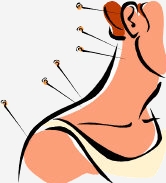 Acupuncture (lat . acus = needle, pungere = sting) has its origin in ancient Chinese medicine. There, at least 2000 years before the Christian era, it was well known that in the human body there exists an energy flow along certain tracks (so-called meridians). This energy appears on the surface of the skin at more than 800 points passing through 12 meridians on the way. According to Chinese medicine certain organs or functions are allocated to these meridians.
Acupuncture (lat . acus = needle, pungere = sting) has its origin in ancient Chinese medicine. There, at least 2000 years before the Christian era, it was well known that in the human body there exists an energy flow along certain tracks (so-called meridians). This energy appears on the surface of the skin at more than 800 points passing through 12 meridians on the way. According to Chinese medicine certain organs or functions are allocated to these meridians.
Modern research shows that acupuncture points are not fictitious. In these places there is a greatly increased electrical conductivity and a decreased, specific skin resistance.
What is the philosophy of acupuncture?
According to traditional Chinese medicine, man is an image of the natural harmony between heaven and earth, between Yin and Yang, and part of the cosmic rhythm.
What is a disease according to Chinese medicine?
It does not mean a change that occurred in a single organ, but the imbalance of the energy flow throughout the body. Pathogenic stimuli are transmitted through the meridians, which are influenced by acupuncture points. According to Chinese thinking, you can define health as a harmonious flow of life energy (Qi).
What is the goal of acupuncture?
This therapy tries to restore the natural balance in the body. A malaise is an expression of the disturbed equilibrium. Here no symptoms will be treated; the treatment includes the whole organism. The goal is to restore an energetic harmony.
What are the effects of acupuncture?
Experimentally proven effects of acupuncture are: pain relief, relaxation, inflammation inhibition, mood elevation and strengthening of the immune system.
How does an acupuncture session work?
The practitioner begins the 20 to 30 minute treatment by providing the patient a calm and relaxed position. Acupuncture is applied mostly lying down, sometimes also sitting. The practitioner will apply as few needles as possible. After 20 minutes at the earliest, the needles are pulled out and the acupuncture is complete. Usually 10 to 15 acupuncture sessions will be held.
Is it always necessary to use needles?
If needling is too unpleasant for individual patients or if there are fears of classical acupuncture, it might be possible to use laser acupuncture, which has a high efficacy especially with children. As the name suggests, a concentrated, high-energy beam of light is used instead of needles.
What are the areas of application?
- allergic diseases
- respiratory diseases
- gynecological diseases
- skin diseases
- gastrointestinal diseases
- migraines and headaches
- neurological disorders
- orthopedic disorders
- pain treatment
Which diseases should not be treated?
- cancer
- Serious mental illness
Are there any other methods of treatment in the field of acupuncture?
Other treatments are cupping over the acupuncture points and ear acupuncture. This method is often used combined with body acupuncture.
What are the side effects and complications?
Conceivable but unlikely are inflammations and infections at the acupuncture points, a puncture of organs or nerves and bruising.


